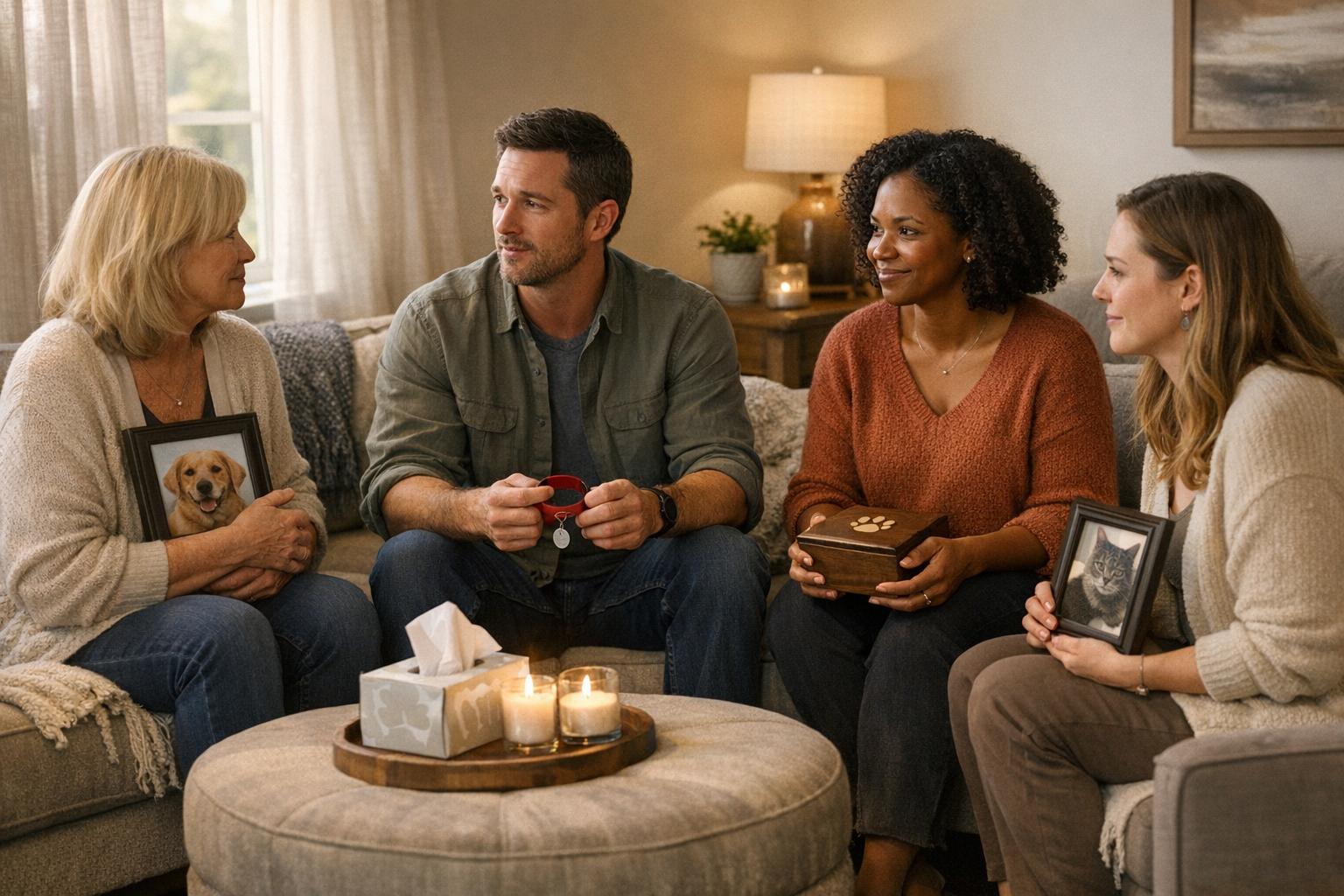Losing a pet can be one of the most challenging experiences for a child, as they may struggle to understand their feelings of grief and loss. To help your kids process the loss of a pet, create a space for open dialogue and encourage them to express their emotions without judgment. It’s important to guide them through this complex emotional landscape, providing comfort and understanding.
You can introduce age-appropriate discussions about death and loss, helping your child to grasp these concepts in a way that resonates with their level of understanding. Engaging in activities like creating a memorial or sharing favorite memories can make this process more tangible and meaningful. At Animal Aftercare, we are devoted to providing compassionate care with our 24/7 Pet and Equine Cremation and Euthanasia services, ensuring that you and your family receive support during this sensitive time.
While helping your child cope, remember that sharing your own feelings about the loss can foster a deeper bond and assure them they are not alone in their grief. By working through these emotions together, you can ultimately teach resilience and strengthen their ability to navigate loss in the future.
Understanding Pet Loss
The bond between your family and your pet is profound and can be particularly challenging when facing their loss. Understanding this connection helps in navigating emotions and processing the finality of death, which can be complex, especially for children.
Recognizing the Bond Between Pets and Families
Pets often play vital roles in family dynamics. They provide companionship, comfort, and unconditional love. For many children, pets are their first experience with deep emotional attachment.
Acknowledge how your child interacts with the pet. They may have shared playtime, cuddles, or quiet moments. Discuss these memories to validate their feelings. Encourage your child to express their emotions, whether through talking or writing.
Creating a memorial can also help solidify this bond and provide a sense of closure. Consider activities such as planting a tree or making a scrapbook. This process reinforces the idea that the love for a pet continues even after their passing.
Comprehending the Finality of Death
Understanding the permanence of death can be particularly difficult for children. It's essential to explain death in clear, honest terms. Avoid euphemisms—phrases like "put to sleep" can confuse young minds.
Open discussions can help children process their emotions about the loss. Be prepared to answer their questions, no matter how challenging. Explain that when a pet dies, it is a natural part of life, but it also means the pet won’t come back.
Guiding your child through this emotional journey is crucial. You may also want to seek professional help if the child struggles significantly with grief. Services from Animal Aftercare are available for support regarding pet loss, ensuring compassionate care during this emotional time. They provide 24/7 Pet and Equine Cremation and Euthanasia services, making sure your needs are met with sensitivity.
Initiating the Conversation
Discussing the death of a family pet with your child can be challenging. Specific timing and language can create a supportive environment for these discussions.
Choosing the Right Time and Place
Select a quiet, comfortable setting where your child feels safe. Familiar spaces, like their bedroom or a cozy corner of the living room, can help facilitate discussions.
Timing is also crucial. Avoid moments of stress, such as during a busy day or right before bed. Instead, choose a time when you can dedicate your full attention, allowing for an open dialogue.
Be prepared for a range of emotions. These conversations may bring up feelings of sadness, confusion, or even anger. Your calm demeanor will reassure your child that it's okay to express their feelings.
Using Age-Appropriate Language
Tailor your language to your child's developmental stage. For younger children, simple, clear explanations work best. You might say, "Our pet has died. This means we won’t see them again."
Older children can grasp more complex ideas. You can discuss concepts like the cycle of life, making it clearer why loss happens. Offer opportunities for them to ask questions, ensuring they understand.
Reassure your child that it’s normal to feel a mix of emotions. Highlighting positive memories can also help them process their grief.
If desired, consider involving rituals, like creating a memory box or small memorial. This can provide a concrete way to honor their pet's memory.
While navigating the conversation, remember that Animal Aftercare is available for support. We provide 24/7 pet and equine cremation and euthanasia services, ensuring compassionate care during difficult times.
Navigating the Grieving Process
Understanding the grieving process for children involves recognizing their unique emotional responses and creating a safe environment for sharing feelings. Encouraging open communication and validating emotions is essential as they navigate through this difficult time.
Allowing for Different Emotional Reactions
Children may express grief in various ways. Some might display sadness, while others may act out, seeming indifferent or even playful. It is crucial to acknowledge that these responses are all valid. Encourage your child to be open about their feelings, assuring them that it's normal to experience a mix of emotions.
You can help them articulate their feelings by asking leading questions. For instance, “How do you feel when you think about your pet?” This encourages reflection and offers insight into their emotional state. Familiarize yourself with common stages of grief, like denial or anger, to understand what they might experience next. Each child's journey through grief is unique, so remain patient and supportive.
Creating a Space for Sharing Feelings
Establishing a dedicated space for open discussion about loss is beneficial. This can be a specific time each day devoted to talking about your pet, where your child feels safe expressing their emotions. Encourage them to share memories, look at photos, or describe their favorite moments together.
Using creative outlets, like drawing, writing, or storytelling, can further facilitate expression. Providing materials like journals or art supplies can help your child process their feelings visually. Allowing them to create a memorial can also provide a tangible way for them to honor their pet.
If you find it challenging to navigate these emotions, consider seeking support from professionals or community resources focused on grief. Animal Aftercare also offers compassionate services for 24/7 pet and equine cremation and euthanasia, ensuring that your pet's passing is handled with care and respect.
Honoring and Remembering Your Pet
Finding meaningful ways to honor your pet can help your child cope with the grief of losing a beloved animal companion. Engaging in memorials and preserving positive memories fosters healing and provides a sense of closure.
Creating Memorials and Rituals
Establishing a memorial can be a vital step for your child. Consider hosting a small memorial service at home or in a favorite outdoor space. This gathering can include family and friends sharing stories, lighting candles, or reading poems that celebrate your pet's life.
You can also create a physical memorial. Options include planting a tree or flowers in memory of your pet or crafting a special collage with photos and mementos. Some families find comfort in creating a memory box filled with your pet's belongings, such as their collar, toys, or favorite blanket.
Animal Aftercare offers a compassionate approach to pet memorials and cremation services. If you need assistance with making arrangements, their team is available 24/7 to support your family during this difficult time.
Preserving Positive Memories
Preserving your pet's memory can aid in healing. Encourage your child to write a letter to their pet expressing their feelings or recounting favorite moments. This exercise promotes emotional expression and reflection on joyful experiences shared with their pet.
Another idea is to create a scrapbook that documents your pet's journey. Include photos, stories, and drawings that capture your pet's personality. This tangible keepsake can serve as a cherished reminder of the happy times.
Consider keeping a spot in your home where your child's pet's favorite items—like a bed or toy—remain. This area can serve as a comforting space for reflection. By remembering your pet fondly, you help your child process their grief constructively.
Moving Forward After Loss
Navigating the aftermath of a pet's death can be challenging for both you and your children. While it's important to allow space for grief, finding ways to move forward can provide comfort and healing.
Discussing the Possibility of New Pets
Introducing the idea of a new pet can be a delicate topic. It's vital to assess whether your children are ready to welcome another animal into your home. Discuss openly how they feel about the loss.
You might ask questions like:
- "What do you miss most about our pet?"
- "How do you feel about getting another pet?"
If they express interest, share the responsibilities involved in caring for a new pet. Emphasize that a new companion does not replace the lost pet but honors its memory.
Consider visiting local shelters for family discussions on adopting. This experience can teach your children the importance of compassion and responsibility.
Finding Support and Resources
Finding support during this time can be invaluable. Encourage your kids to express their feelings openly. Engaging in family discussions about grief can foster emotional understanding.
Books about pet loss can provide comfort and help your child articulate their feelings. Look for titles tailored to children, as these can be particularly effective.
Additionally, exploring resources such as support groups can be beneficial. Organizations like Animal Aftercare offer guidance and professional help tailored to families coping with pet loss.
Having access to 24/7 Pet and Equine Cremation and Euthanasia services means that you are not alone during these difficult times. Knowing there's a support system in place allows you to focus on healing.







